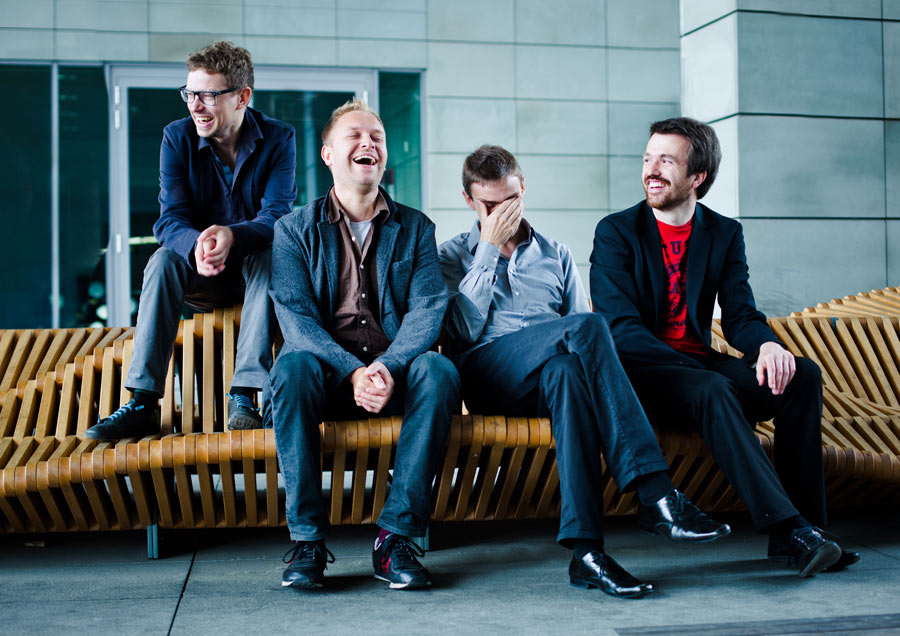Arvo Pärt was born in Paide, Estonia, in 1953. He studied at the Tallinn Conservatory and later worked as a sound engineer at Estonia Radio while composing music for film and theatre. His early concert music experimented with neo-classicism and avant-garde styles, which in 1962 begot censure from the Soviet Composers Union. Six years later, his work Credo was banned after its premiere for professing the Christian faith. During the 1970s, Pärt developed a new style influenced by early polyphony, which he called tintinnabuli. The basis of the tintinnabuli style is a two-part harmonic texture created by a melodic voice and a tintinnabuli voice sounding the tonic triad. It is a minimalistic compositional style, which gets its name from the bell-like resemblance of notes in a triad. Fratres written in 1977, has no single definitive instrumentation and is one of the first compositions to explore the technique of tintinnabuli. The first performance of the work was given by the Estonian early music ensemble, Hortus musicus. Pärt composed the original version, in 1977, for quintets of winds and strings, later creating variations on this work for violin and piano on commission from the Salzburg Festival. The work now exists in numerous arrangements scored for a variety of ensembles. His publisher offers sixteen different versions, which have been arranged or authorized by Pärt.
Krzysztof Meyer, born August 11, 1943, is a Polish composer, musicologist, and pianist. He studied composition with Wiechowicz and Penderecki at the Academy of Music in Kraków and took lessons with Boulanger, in Paris. He received first prize at the Prince Rainier of Monaco competition and the Szymanowski competition as well as the Herder Prize, the Polish Composers’ Union prize and the award of the New York Jurzykowski Foundation. He served as the Dean of the Department of Music Theory at the State College of Music in Kraków from 1972 to 1975, the president of the Union of Polish Composers from 1985 to 1989, and as professor of composition at the Hochschule für Musik, in Cologne prior to retiring in 2008. Meyer composed 13 string quartets between 1963 and 2014 containing a wide range of emotions. His music has been described as elegant, energetic and intense. While he did have a passing curiosity with Polish sonorism, his modern style draws on mainstream 20th century music from Hungary, Russia and Poland, and on 18th and 19th century musical forms.
In 1951 the Polish Composers' Union asked Grażyna Bacewicz to create a work for the Concours International, pour Quatuor à Cordes, in Liège. The result was her String Quartet No. 4. It was first performed by the Quatuor Municipal de Liège on September 21, 1951, and won first prize. Bacewicz knew how to write for string instruments and treated the violin and other strings with special attention. This came as a consequence of her violin studies under Józef Jarzębski in Warsaw and under André Touret and Karl Flesch in Paris. Bacewicz enjoyed success before the war, as a composer and violinist, and a scholarship from the legendary Jan Paderewski made it possible for her to go to Paris and study with Nadia Boulanger. Nearly the same age as Witold Lutosławski, Bacewicz like her contemporaries dreamt of making Polish music an integrated part of the contemporary European music scene. The composer wrote, “I disagree with those who maintain that once a composer develops her own style, she should stick to it. I find such an opinion totally alien; it impedes further development and growth. Every composition completed today will belong to the past tomorrow.”
Franz Joseph Haydn composed the six quartets of his Opus 76 shortly after returning from his second trip to London. His career as a court composer for the Esterhazy family was drawing to a close and his status as an international celebrity was robust. After two tours of England, he returned to Vienna a wealthy man, free to compose whatever he desired. It was also a period in which he was moving away from instrumental music and would only write a few more string quartets. String Quartet in D Minor sometimes nicknamed the “Quinten” (Fifths) because the first movement is constructed around the interval, is particularly impressive for the tension that arises from the stark opposition of D major and D minor. The six quartets of Opus 76 are regarded as the utmost accomplishment of Haydn’s career as a string quartet composer as well as fulfilling Goethe’s wish that a string quartet be a “civilized conversation between four independent personalities.”
Alixandra Porembski, English Language Annotator



